Fleurs du Mal Magazine


Or see the index
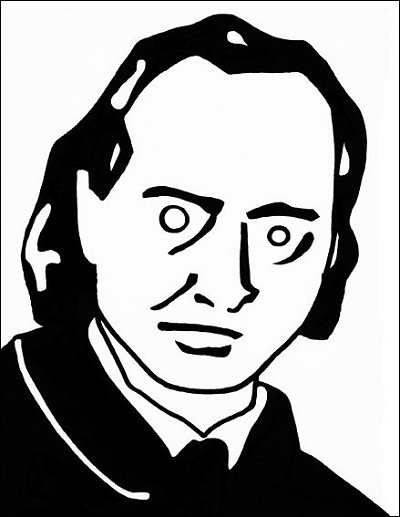
Wouter van Riessen
BOEKUITGAVE HOMMAGE À BAUDELAIRE
Uitgeverij Voetnoot bestaat 25 jaar. Galerie Baudelaire bestaat 10 jaar. Oprichters Henrik Barends en Anneke Pijnappel vonden dit aanleiding genoeg om betrokken schrijvers, dichters, vertalers, fotografen en kunstenaars te vragen een hommage aan Baudelaire te maken.
Waarom een hommage aan Baudelaire? Twee motieven liggen hieraan ten grondslag. Voetnoot ging van start met de Nederlandse vertaling van de Kunstkritieken van Charles Baudelaire (1821 – 1867). In zijn kunstkritische beschouwingen stelde deze Franse dichter, schrijver en kunstcriticus de scheppende verbeelding boven het uitbeelden van de zichtbare werkelijkheid. Deze stelling vormt ook het uitgangspunt van van de fotografie die in Galerie Baudelaire wordt getoond. De verrassende bijdragen zijn bijeengebracht in de bundel Hommage à Baudelaire.
De invulling van het thema Baudelaire is vanzelfsprekend prikkelend, uitgesproken, wakkerschuddend, rauw, soms beneveld, soms juist niet, en door de totaal verschillende invalshoeken ook steeds weer boeiend.
Bijdragen: Anne van Amstel, Henrik Barends, Pierre Bergounioux, Patricia Beysens, Diana Blok, Wineke de Boer, Rommert Boonstra, Bart Brey, Marlo Broekmans, Denis Brun, Maarten van Buuren, Julien Coulommier, Kiki Coumans, Peter Day, Martijn Doolaard, Drs.P, Just Enschedé, Winfred Evers, Jan Eyskens, Paul Fleming, Lionel Fourneaux, René Franken, Philip Freriks, d’Hanis & Lachaert, Martin de Haan, Hardeman & Schilstra, Rokus Hofstede, Jos Houweling, Paul Ilegems, Evelyn Jansen, Freda Kamphuis, Hilde Keteleer, Herman Koch, Bart Koubaa, Arthur Lava, Ingeborg Leijerzapf, Dirk Leyman, Winnifred Limburg, Bart Van Loo, Guus Luijters, Sylvia Marijnissen, Eddie Marsman, Lotte Menkman, Kees Mercks, Pierre Michon, Eric Min, Cornelia Nauta, Paul & Menno de Nooijer, Laurent Olivès, Paul Overdijk, Jef Paepen, Ruudt Peters, Susanne Piët, Anneke Pijnappel, Hans van Pinxteren, Rudo Prekop, Wouter van Riessen, William Ropp, Nora De Rudder, Tineke de Ruiter, Schilte & Portielje, K. Schippers, Désirée Schyns, Carolein Smit, Vasil Stanko, Tono Stano, F. Starik, Rob Steenhorst, Jan Pieter van der Sterre, Miro Svolik, Michel Szulc Krzyzanowski, Henk Tas, Nadine Tasseel, Rob Versluys, Jan Vissers, Oscar Voch, Andrea Voigt, Barbara de Vries, Jacquie Maria Wessels, Ivo de Wijs, Lam de Wolf, John Wood, Willem van Zadelhoff, Vladimir Zidlicky, Aart van Zoest, Peter Zupnik
Deze jubileumuitgave bevat 340 pagina’s, 20 x 15,5 cm, is geïllustreerd, is beschikbaar met vier verschillende omslagen en is niet te koop in de boekhandel. In Nederland exclusief verkrijgbaar in de boekwinkel van Bijzondere Collecties UvA, Turfmarkt 129, Amsterdam en via www.voetnootpublishers.nl. Prijs € 15.
BOEKENSALON + EXPO BARENDS & PIJNAPPEL: 19.9/30.9
Op 19 september droeg grafisch vormgever Henrik Barends (Amsterdam, 1945) zijn archief officieel over aan de Universiteit van Amsterdam, afdeling Bijzondere Collecties. Deze overdracht en het jubileum van Uitgeverij Voetnoot vormden de aanleiding tot een feestelijke boekensalon, die vergezeld gaat van een kleine expositie. Museumcafé, Oude Turfmarkt 129, Amsterdam. Dinsdag – vrijdag van 10 – 17 uur, zaterdag – zondag van 13 – 17 uur.
GALERIE BAUDELAIRE – VLAAMSEKAAI 28/ANTWERPEN – 9.9/6.10
Groepstentoonstelling Hommage à Baudelaire met de visuele bijdragen van alle bovengenoemde fotografen en kunstenaars. Open zaterdag 14 – 18 uur en op afspraak. www.galeriebaudelaire.be
fleursdumal.nl magazine
More in: Archive A-B, Archive A-B, Baudelaire, Charles, Freda Kamphuis

Zilveren favorieten
bij het schilderij van Lawrence Alma-Tadema
Water om water. Daartussen vrouwen,
die drie die standbeeld zijn van eigen stilleven,
rustend op marmer alsof zij er zelf van schijnen.
Kruimels hangen stil tussen een hand en mondjes
van vissen die liever dan bekeken
onzichtbaar zouden zwemmen in de open
zee die zij veraf vermoeden en dichter hopen.
Wij weten haar vlakbij. Geen geluid weerklinkt
al zingt in elk hoofd een droom.
Zeer strak staat alles stil en nauwelijks
nog is blauw een kleur te noemen.
De wereld lijkt wel monochroom.
Bert Bevers
(uit Afglans – Gedichten 1972-1997, Uitgeverij WEL, Bergen op Zoom, 1997)
kempis.nl poetry magazine
More in: Archive A-B, Bevers, Bert
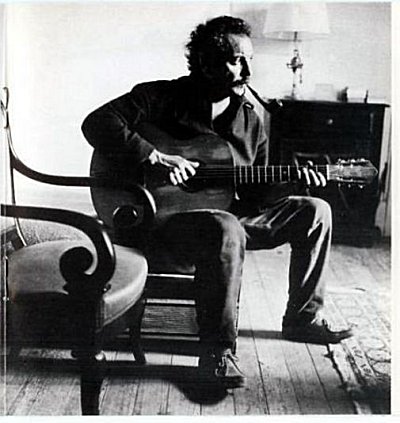
Georges Brassens
(1921-1981)
Les copains d’abord
Non, ce n’était pas le radeau
De la Méduse, ce bateau,
Qu’on se le dis’ au fond des ports,
Dis’ au fond des ports,
Il naviguait en pèr’ peinard
Sur la grand’ mare des canards,
Et s’app’lait les Copains d’abord
Les Copains d’abord.
Ses fluctuat nec mergitur
C’était pas d’la litteratur’,
N’en déplaise aux jeteurs de sort,
Aux jeteurs de sort,
Son capitaine et ses mat’lots
N’étaient pas des enfants d’salauds,
Mais des amis franco de port,
Des copains d’abord.
C’étaient pas des amis de lux’,
Des petits Castor et Pollux,
Des gens de Sodome et Gomorrh’,
Sodome et Gomorrh’,
C’étaient pas des amis choisis
Par Montaigne et La Boeti’,
Sur le ventre ils se tapaient fort,
Les copains d’abord.
C’étaient pas des anges non plus,
L’Évangile, ils l’avaient pas lu,
Mais ils s’aimaient tout’s voil’s dehors,
Tout’s voil’s dehors,
Jean, Pierre, Paul et compagnie,
C’était leur seule litanie
Leur Credo, leur Confiteor,
Aux copains d’abord.
Au moindre coup de Trafalgar,
C’est l’amitié qui prenait l’quart,
C’est elle qui leur montrait le nord,
Leur montrait le nord.
Et quand ils étaient en détresse,
Qu’leurs bras lancaient des S.O.S.,
On aurait dit les sémaphores,
Les copains d’abord.
Au rendez-vous des bons copains,
Y’avait pas souvent de lapins,
Quand l’un d’entre eux manquait a bord,
C’est qu’il était mort.
Oui, mais jamais, au grand jamais,
Son trou dans l’eau n’se refermait,
Cent ans après, coquin de sort !
Il manquait encor’.
Des bateaux j’en ai pris beaucoup,
Mais le seul qui ait tenu le coup,
Qui n’ai jamais viré de bord,
Mais viré de bord,
Naviguait en père peinard
Sur la grand’ mare des canards,
Et s’app’lait les Copains d’abord
Les Copains d’abord.
Georges Brassens poetry
kempis.nl poetry magazine
More in: Archive A-B
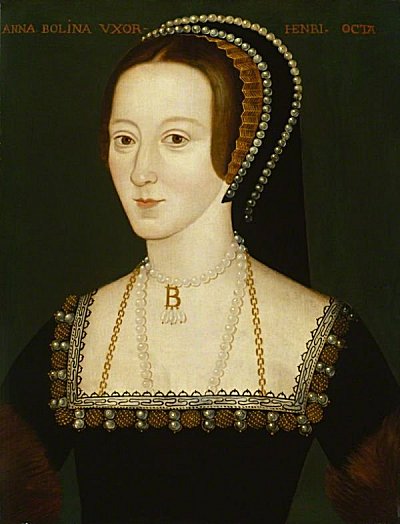
Anne Boleyn?
(1507?-1536)
O Death, Rock Me Asleep
DEATH, rock me asleep,
Bring me to quiet rest,
Let pass my weary guiltless ghost
Out of my careful breast.
Toll on, thou passing bell;
Ring out my doleful knell;
Let thy sound my death tell.
Death doth draw nigh;
There is no remedy.
My pains who can express?
Alas, they are so strong;
My dolour will not suffer strength
My life for to prolong.
Toll on, thou passing bell;
Ring out my doleful knell;
Let thy sound my death tell.
Death doth draw nigh;
There is no remedy.
Alone in prison strong
I wait my destiny.
Woe worth this cruel hap that I
Should taste this misery!
Toll on, thou passing bell;
Ring out my doleful knell;
Let thy sound my death tell.
Death doth draw nigh;
There is no remedy.
Farewell, my pleasures past,
Welcome, my present pain!
I feel my torments so increase
That life cannot remain.
Cease now, thou passing bell;
Rung is my doleful knell;
For the sound my death doth tell.
Death doth draw nigh;
There is no remedy.
Anne Boleyn poetry
fleursdumal.nl magazine
More in: Anne Boleyn, Archive A-B

Een Egyptische weduwe
bij het schilderij van Lawrence Alma-Tadema
Wij weten nu dat deze schilder wist
dat eeuwen her zich deze dode
als een mummie naar de toekomst wrong
in uitgeleefde luchten en vluchtte
in hiernamaalsen waarin hij zelf
geloofde. Ter plekke zong de twijfel:
men roofde graven leeg en zweeg en
daarom neuriet er de hoop dat
rust hier mag gaan heersen.
De weduwe treurt diep maar ondertussen
leert ze van het sterven: het lot
vermomt zich graag als einde.
Bert Bevers
(uit Afglans – Gedichten 1972-1997, Uitgeverij WEL, Bergen op Zoom, 1997)
kempis.nl poetry magazine
More in: Archive A-B, Bevers, Bert
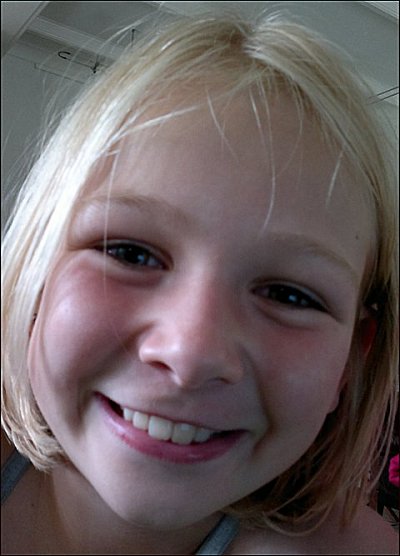
Pas geleden
Weet ik nog?
Wil ik nog?
Was ik weg,
voor even?
Zeg het me,
want pas geleden
is maar kort!
Pleun Andriessen
Pleun Andriessen is kinderstadsdichter van Tilburg 2011-2012
kempis.nl poetry magazine
More in: Andriessen, Pleun, Archive A-B
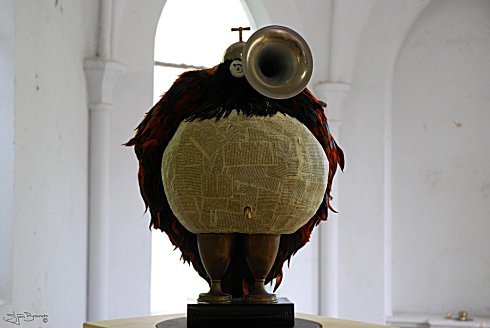
‘Twiet Twiet’
tentoonstelling sjon brands
Vreemde Vogels op het Vinkentouw
Van zaterdag 22 t/m zondag 30 september 2012 in de Franciscanessenkapel, Bisschop Zwijsenstraat 22 te Tilburg, dagelijks van 14.00-17.00 uur en 20.00-23.00uur. Opening vrijdagavond 21 september om 20.00 uur.
Met medewerking van Martijn de Boer, Geno Spoormans, Thijs Caspers, Jacq Palinckx, Katja Heitmann, Carina van der Walt, Wim Mengels, Martijn Neggers, Andrew Cartwright, Ad van Iersel, Hans Sparla, Nick J Swarth, Gert Brunink, David en Martijn, en het Theater van de Verloren Tijd.
‘Twiet Twiet’ is een tentoonstelling van vreemde vogels, die vrolijk de spot lijken te drijven met ons ‘arme’ mensen. Het zijn indringende beelden opgebouwd uit afvalmateriaal, met toeters en veren, glazen ogen en koperen poten. Kortom, uit alles wat je op straat en in huis kunt vinden. Het is een bos bonte karikaturen van ons menselijk bestaan.
Deze tweede expositie van Sjon Brands toont ons 28 kleurrijke vogels. Zij vliegen elkaar voortdurend in de veren met echte vogelgeluiden en stukken mensentaal. Het is een 24-sporige geluidscollage geworden van vogelzang, gedichten en prettig gestoorde onzintekst. De vogels laten ons een verkwikkende verzameling menselijke ondeugden zien en horen.
Tijdens de opening en de beide zondagmiddagen is er een aantrekkelijk programma rondom vreemde vogels met bovengenoemde muzikanten, dansers, dichters en beeldend kunstenaars.
De toegang is gratis en u bent van harte welkom. Info 013 5358041 of www.sjonbrands.nl
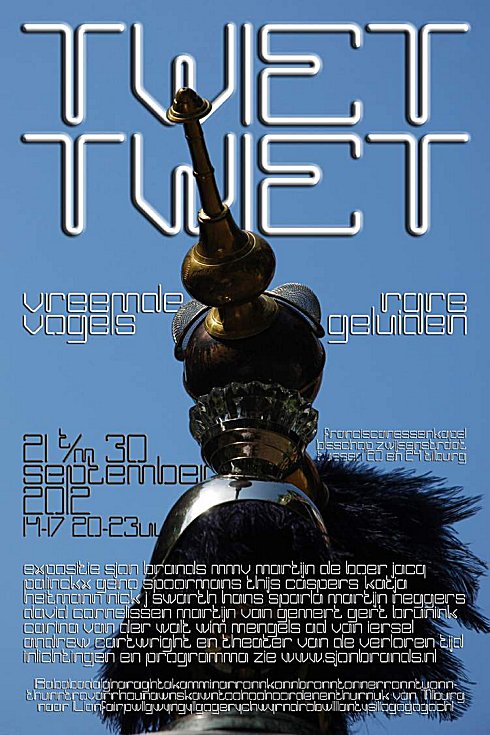
fleursdumal.nl magazine
More in: Archive A-B, Brands, Sjon
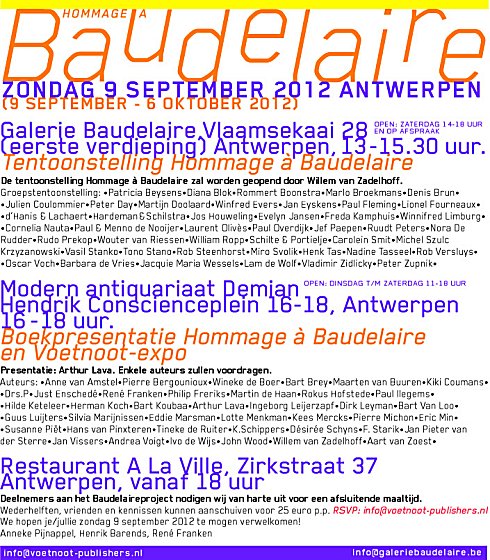
ZONDAG 9 SEPTEMBER 2012 ANTWERPEN
(9 SEPTEMBER – 6 OKTOBER 2012)
Galerie Baudelaire,Vlaamsekaai 28
(eerste verdieping) Antwerpen, 13 – 15.30 uur
Tentoonstelling Hommage à Baudelaire
Modern antiquariaat Demian
Hendrik Conscienceplein 16-18, Antwerpen
16 – 18 uur
Boekpresentatie Hommage à Baudelaire en Voetnoot-expo
Restaurant A La Ville, Zirkstraat 37, Antwerpen, vanaf 18 uur
Groepstentoonstelling: •Patricia Beysens • Diana Blok•Rommert Boonstra • Marlo Broekmans • Denis Brun •Julien Coulommier•Peter Day • Martijn Doolaard•Winfred Evers•Jan Eyskens•Paul Fleming • Lionel Fourneaux • d’Hanis & Lachaert • Hardeman & Schilstra • Jos Houweling • Evelyn Jansen•Freda Kamphuis • Winnifred Limburg • Cornelia Nauta•Paul & Menno de Nooijer • Laurent Olivès • Paul Overdijk • Jef Paepen • Ruudt Peters • Nora De Rudder • Rudo Prekop • Wouter van Riessen•William Ropp •Schilte & Portielje • Carolein Smit•Michel Szulc Krzyzanowski • Vasil Stanko • Tono Stano • Rob Steenhorst • Miro Svolik • Henk Tas•Nadine Tasseel • Rob Versluys • Oscar Voch • Barbara de Vries • Jacquie Maria Wessels • Lam de Wolf • Vladimir Zidlicky • Peter Zupnik •
De tentoonstelling Hommage à Baudelaire zal worden geopend door Willem van Zadelhoff.
Auteurs: •Anne van Amstel •Pierre Bergounioux •Wineke de Boer •Bart Brey •Maarten van Buuren •Kiki Coumans• •Drs.P •Just Enschedé •René Franken •Philip Freriks •Martin de Haan •Rokus Hofstede •Paul Ilegems• •Hilde Keteleer •Herman Koch •Bart Koubaa •Arthur Lava •Ingeborg Leijerzapf •Dirk Leyman •Bart Van Loo• •Guus Luijters •Silvia Marijnissen •Eddie Marsman •Lotte Menkman •Kees Mercks •Pierre Michon •Eric Min• •Susanne Piët •Hans van Pinxteren •Tineke de Ruiter •K.Schippers •Désirée Schyns •F. Starik •Jan Pieter van der Sterre •Jan Vissers •Andrea Voigt •Ivo de Wijs •John Wood •Willem van Zadelhoff •Aart van Zoest•
Presentatie: Arthur Lava. Enkele auteurs zullen voordragen. We hopen je/jullie zondag 9 september 2012 te mogen verwelkomen! Anneke Pijnappel, Henrik Barends, René Franken
OPEN: DINSDAG T/M ZATERDAG 11-18 UUR
OPEN: ZATERDAG 14-18 UUR EN OP AFSPRAAK
fleursdumal.nl magazine
More in: - Book News, Archive A-B, Archive A-B, Baudelaire, Charles, Freda Kamphuis

Winterlandschap met kauwtjes
Bij het werk van Valerius De Saedeleer
Ziet: alles vangt aan. Hoe schaduw knaagt aan
de leegte der velden, stilte gaten in de flank weigert.
In dit kader hebben heuvels recht op stilstand,
bomen en avondval niet. O, deze afwezigheid van nabij.
Winter kent geen verdriet maar strak als een zwangere buik
is het hart vol kreupelhout. Veel moet hier niet gebeuren.
Bert Bevers
(Eerder verschenen in Revolver, 28ste jaargang, nummer 111, Antwerpen, 2001)
kempis.nl poetry magazine
More in: 4SEASONS#Winter, Archive A-B, Bevers, Bert
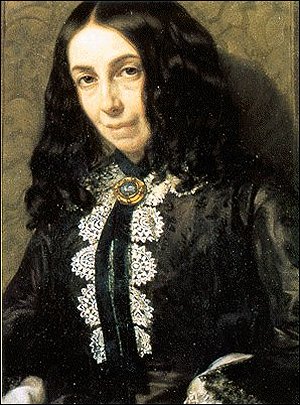
Elizabeth Barrett Browning
(1806 – 1861)
The Cry Of The Children
Do ye hear the children weeping, O my brothers,
Ere the sorrow comes with years?
They are leaning their young heads against their mothers—
And that cannot stop their tears.
The young lambs are bleating in the meadows;
The young birds are chirping in the nest;
The young fawns are playing with the shadows;
The young flowers are blowing toward the west—
But the young, young children, O my brothers,
They are weeping bitterly!—
They are weeping in the playtime of the others
In the country of the free.
Do you question the young children in the sorrow,
Why their tears are falling so?—
The old man may weep for his to-morrow
Which is lost in Long Ago—
The old tree is leafless in the forest—
The old year is ending in the frost—
The old wound, if stricken, is the sorest—
The old hope is hardest to be lost:
But the young, young children, O my brothers,
Do you ask them why they stand
Weeping sore before the bosoms of their mothers,
In our happy Fatherland?
They look up with their pale and sunken faces,
And their looks are sad to see,
For the man’s grief abhorrent, draws and presses
Down the cheeks of infancy—
“Your old earth,” they say, “is very dreary;”
“Our young feet,” they say, “are very weak!
Few paces have we taken, yet are wearyÑ
Our grave-rest is very far to seek.
Ask the old why they weep, and not the children,
For the outside earth is cold,—
And we young ones stand without, in our bewildering,
And the graves are for the old.
“True,” say the young children, “it may happen
That we die before our time.
Little Alice died last year—the grave is shapen
Like a snowball, in the rime.
We looked into the pit prepared to take her—
Was no room for any work in the close clay:
From the sleep wherein she lieth none will wake her
Crying, ‘Get up, little Alice! it is day.’
If you listen by that grave, in sun and shower,
With your ear down, little Alice never cries!—
Could we see her face, be sure we should not know her,
For the smile has time for growing in her eyes—
And merry go her moments, lulled and stilled in
The shroud, by the kirk-chime!
It is good when it happens,” say the children,
“That we die before our time.”
Alas, alas, the children! they are seeking
Death in life, as best to have!
They are binding up their hearts away from breaking,
With a cerement from the grave.
Go out, children, from the mine and from the city—
Sing out, children, as the little thrushes do—
Pluck your handfuls of the meadow-cowslips pretty—
Laugh aloud, to feel your fingers let them through!
But they answer, “Are your cowslips of the meadows
Like our weeds anear the mine?
Leave us quiet in the dark of the coal-shadows,
From your pleasures fair and fine!
“For oh,” say the children, “we are weary,
And we cannot run or leap—
If we cared for any meadows, it were merely
To drop down in them and sleep.
Our knees tremble sorely in the stooping—
We fall upon our faces, trying to go;
And, underneath our heavy eyelids drooping,
The reddest flower would look as pale as snow.
For, all day, we drag our burden tiring,
Through the coal-dark, underground—
Or, all day, we drive the wheels of iron
In the factories, round and round.
“For, all day, the wheels are droning, turning,—
Their wind comes in our faces,—
Till our hearts turn,—our head, with pulses burning,
And the walls turn in their places—
Turns the sky in the high window blank and reeling—
Turns the long light that droppeth down the wall—
Turn the black flies that crawl along the ceiling—
All are turning, all the day, and we with all.—
And, all day, the iron wheels are droning;
And sometimes we could pray,
‘O ye wheels,’ (breaking out in a mad moaning)
‘Stop! be silent for to-day!’ “
Ay! be silent! Let them hear each other breathing
For a moment, mouth to mouth—
Let them touch each other’s hands, in a fresh wreathing
Of their tender human youth!
Let them feel that this cold metallic motion
Is not all the life God fashions or reveals—
Let them prove their inward souls against the notion
That they live in you, os under you, O wheels!—
Still, all day, the iron wheels go onward,
Grinding life down from its mark;
And the children’s souls, which God is calling sunward,
Spin on blindly in the dark.
Now, tell the poor young children, O my brothers,
To look up to Him and pray—
So the blessed One, who blesseth all the others,
Will bless them another day.
They answer, “Who is God that He should hear us,
White the rushing of the iron wheels is stirred?
When we sob aloud, the human creatures near us
Pass by, hearing not, or answer not a word!
And we hear not (for the wheels in their resounding)
Strangers speaking at the door:
Is it likely God, with angels singing round Him,
Hears our weeping any more?
“Two words, indeed, of praying we remember,
And at midnight’s hour of harm,—
‘Our Father,’ looking upward in the chamber,
We say softly for a charm.
We know no other words except ‘Our Father,’
And we think that, in some pause of angels’ song,
God may pluck them with the silence sweet to gather,
And hold both within His right hand which is strong.
‘Our Father!’ If He heard us, He would surely
(For they call Him good and mild)
Answer, smiling down the steep world very purely,
‘Come and rest with me, my child.’
“But no!” say the children, weeping faster,
“He is speechless as a stone;
And they tell us, of His image is the master
Who commands us to work on.
Go to!” say the children,—“Up in Heaven,
Dark, wheel-like, turning clouds are all we find.
Do not mock us; grief has made us unbelieving—
We look up for God, but tears have made us blind.”
Do you hear the children weeping and disproving,
O my brothers, what ye preach?
For God’s possible is taught by His world’s loving—
And the children doubt of each.
And well may the children weep before you;
They are weary ere they run;
They have never seen the sunshine, nor the glory
Which is brighter than the sun:
They know the grief of man, but not the wisdom;
They sink in man’s despair, without its calm—
Are slaves, without the liberty in Christdom,—
Are martyrs, by the pang without the palm,—
Are worn, as if with age, yet unretrievingly
No dear remembrance keep,—
Are orphans of the earthly love and heavenly:
Let them weep! let them weep!
They look up, with their pale and sunken faces,
And their look is dread to see,
For they mind you of their angels in their places,
With eyes meant for Deity;—
“How long,” they say, “how long, O cruel nation,
Will you stand, to move the world, on a child’s heart,
Stifle down with a mailed heel its palpitation,
And tread onward to your throne amid the mart?
Our blood splashes upward, O our tyrants,
And your purple shows yo}r path;
But the child’s sob curseth deeper in the silence
Than the strong man in his wrath!”
Elizabeth Barrett Browning poetry
kempis.nl poetry magazine
More in: Archive A-B, Barrett Browning, Elizabeth

Aquae sulis, Bath
Als een spiegelbeeld lijken de baden
de goden te willen behagen, zo strak
spannen zich deze aquae sulis naar boven.
Van marmer welhaast maar toch laat alles
wat zich zien wil zich hierin zien.
Inbreuk doet zelfs beweging ontstaan,
in steeds wijdere cirkels als zou zij
werkelijk slechts om water gaan.
Door de zachte heuvels hieromheen
glijdt zich de Avon. Bijna zeker
moet zij weten van de nevel die bij
avondval gaat hangen tussen beeld en spiegel.
Bert Bevers
(Verschenen in Hollands Maandblad, 29ste jaargang, nummer 481, Den Haag, 1987)
kempis.nl poetry magazine
More in: Archive A-B, Bevers, Bert

Matthew Arnold
(1822 – 1888)
The Last Word
Creep into thy narrow bed,
Creep, and let no more be said!
Vain thy onset! all stands fast.
Thou thyself must break at last.
Let the long contention cease!
Geese are swans, and swans are geese.
Let them have it how they will!
Thou art tired: best be still.
They out-talked thee, hissed thee, tore thee?
Better men fared thus before thee;
Fired their ringing shot and passed,
Hotly charged – and sank at last.
Charge once more, then, and be dumb!
Let the victors, when they come,
When the forts of folly fall,
Find thy body by the wall!
Matthew Arnold poetry
kempis.nl poetry magazine
More in: Archive A-B
Thank you for reading Fleurs du Mal - magazine for art & literature